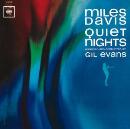Yesterday's Music Is Still Alive: Miles Davis, Quiet Nights
by dave heaton

The great thing about musicians with long discographies is how many interesting corners and turns there tend to be. When you first start listening to the music of someone who released an unmanageable number of recordings, where do you start? Many people naturally turns towards greatest-hits compilations, always a mistake unless you're dealing with someone whose career was built around singles and not albums...and even then there's the danger of not understanding the original context, of not getting a sense for where the songs fit into the musician's career.
The next natural way to go is to get the albums that have been canonized, those that are considered classics (the ones with the checkmarks on All Music). This is cool; you're likely to discover really amazing music this way. But there's still the chance that the tastemakers were wrong, that the albums they disregard as 'minor works' or 'lesser works' are actually really amazing.
So often the 'lesser' albums can be some of the most interesting, whether they're experiments that can't be wrangled into The Story of the Artist, or they're really solid distillations of what the artist was all about, albeit without the 'significance' to give them more attention. With some musicians, the best way to really get a grasp on their music is to jump in head-first, and to hear as many minor works as major ones. Some of the minor ones may become your favorites, or at least albums that you're intrigued enough with to devote a lot of time to.
It's impossible to write about Miles Davis without writing about phases of his career; he changed styles and collaborators so many times that writers have logged many typewriter miles classifying it all, molding it into a cohesive story. That story has been helped along through Columbia's massive reissue and repackaging of his music, which has lead to several box sets which group together phases of his career.
Go to any web site on Miles Davis, and you'll see that they've defined his career through some number of phases. In the Columbia/Legacy version of the Miles story, outlined on Miles-Davis.com, 1963's Quiet Nights falls into the "Miles & Gil - Sketches Of Spain Period". This is both a descriptive classification, as the album was one of four studio collaborations between Miles Davis and arranger Gil Evans, and one that's built around the idea that Sketches of Spain is a classic which everyone must buy if they care about music.
Quiet Nights is by any counts the least of the Davis-Evans albums, yet I listen to it the most. I can't mount any kind of logical argument as to why I prefer it over Sketches of Spain - I'm not sure if it's a "better" album by the standards of most jazz criticism. And I'm certainly not listening it through the quasi-scientific lens that turns me off of most writing about jazz, I'm writing about what the music sounds like to me, and about how it makes me feel, not about its place in history.
Quiet Nights is ostensibly Miles' bossa nova album. What's clear from it, though, is that more than aping the sound of bossa nova as it was heard then, Miles is interpreting the feeling he gets from Brazilian music. Sure, there's some Brazilian tunes played here, like "Aos Pes Da Cruz" and Jobim's "Corcovado." But there's also a Rodgers & Hart standard and a few Davis-Evans compositions. The songs do have bossa nova rhythms to them, but they're remarkably understated; the songs are rhythmic in a gentle, almost fragile way, while the horns float over the top in a graceful way that's just as understated.
Miles' trumpet playing on Quiet Nights isn't as catch-your-breath dynamic as it can sometimes be, and the music overall doesn't have the epic feeling of Sketches of Spain or the energy of Porgy and Bess. Yet it also doesn't have the tilt toward bombast that those earlier Davis-Evans collaborations had. This is streamlined music, music that quietly cuts to the chase, yet it also has the lush sound that Evans helped to stir up in Miles' music.
Quiet Nights lives up to its name in mood, so perfectly. "Summer Night" is so gentle it almost disappears, yet its relaxed beauty perfectly conjures up the feeling of a quiet street on a hot summer night. "Song No. 2" opens the album in a luxurious way that is immediately mood-shifting; it's a simple song, and quite brief, yet it's played in a way that evokes both style and melancholy. Its final seconds fade off in a sad and mysterious way, leading perfectly into the contemplative "Once Upon a Summertime."
What Davis, Evans, and collaborators (the rest of Davis' Quintet at the time: George Coleman, Victor Feldman, Ron Carter, Frank Butler) take so perfectly from bossa-nova is a romantic feeling paired with an introspective, 'lost-in-your-own-thoughts' feeling. In many moments, Quiet Nights subtly, evocatively captures so many complicated feelings at once, while sounding gorgeous.
{Yesterday's Music Is Still Alive is an intermittent feature giving attention to an album of the past. The first installment was on the Jonathan Richman and the Modern Lovers album. }
Copyright © 2005 erasing clouds |
|